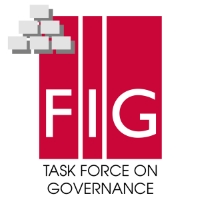FIG Internal Task Forces

|
FIG Task Force on FIG Governance, 2019-22

FIG 2021: FUTURE GOVERNANCE AND MANAGEMENT OF FIG
1. Terms of Reference of Governance Task Force
The terms of reference of the task force were agreed at the FIG
General Assembly held in Istanbul, Turkey 2018, to;
- Evaluate the present governance framework of FIG; and
- If required, based on the findings, propose changes and, if
necessary, an alternative internal structure of FIG to meet the
future “needs and expectations” of its membershipin order to set a
context for possible changes to FIG post 2021.
- Following the launch and initial discussions held in Hanoi 2019
a Position statement was drafted and submitted to Council in order
to be clear on the framework for discussing the future governance of
the FIG 2021 TF onwards.
The TOR identifies the following key outcomes from the review:
- Documented analysis of the FIG governance framework, being the
administration and organisational structure of FIG, in terms of how
it meets the current and future needs and expectations of member
associations
- Recommendations and proposed changes to the FIG governance
framework
- Recommendation regarding the ongoing need for a group to review
FIG governance and responsiveness to member association
requirements, and the form and structure such a review group should
take.
2. Summary Rational and outcome:
The world in 2019 is very different from 1800’s, when FIG was
founded. As an organisation we have held several organisational
reviews in the past; but now society is facing unprecedented changes in
our world. The impact of big data and artificial intelligence,
climate change, urbanisation on an unprecedented scale are just a few of
the challenges we now face.
The TF FIG 2021 strategic question is to ensure the governance
framework (which includes the administration and organisational
structure of FIG) is effective, efficient and dynamic so as to meet the
future needs and expectations of members – i.e. is it fit for the
future.
A Governance review was undertaken and reported in 2001, a second
partial review undertaken and reported in 2018. With the fast pace
of change in our world, the latter review emphasised the need for a
fundamental review of the framework for governing and managing FIG.
Drawing from this, it is proposed that the TF considers a ‘future’
horizon of 10 years (i.e. 2 terms) with the next review potentially in
2030.
The current structure and function of FIG is to be evaluated via a
participatory process including the Council, ACCO, Commissions,
Networks, Task Forces and the FIG Office. In seeking to promote
debate about the future Governance of the Federation it should be
stressed that ongoing reporting will be a feature.
3. Program of Work
Over the next 18 months a series of consultation with you, our
members and external stakeholders will be held – these will be
scheduled between the FIG working weeks along with round table meetings
during the working week.
The current structure and function of FIG is to be evaluated, via a
participatory process-
Why are adopting this larger consultative process?
Because effectively a crowdsourcing collaborative approach means we
are including you as a body of people (experts and non- experts) to
contribute to our defined project problem to benefit from the wisdom of
us all. We will also invite our key stakeholders to this debating
forum
We aim to keep our on-line deliberations innovative so our debates
with you will use a variety of on-line formats. To gather as much
input as possible a systematic process has been devised with a number of
work packages. The indicative ‘Road map of the debating work
packages (WP) can be found here [LINK to pdf position statement].
4 The members of the Task Force are:
Chair: Diane Dumashie
- Members:
- Hansjoerg Kutterer, Germany
- Jakoba Kgopolelo, Botswana
- James Kavanagh, UK
- Jurg Kaufmann, Switzerland
- Kate Fairlee, Australia
- Kwabena Asiama, Ghana
- Louise Friis-Hansen, FIG
- Maurice Barbieri, Switzerland
- Milka Pietrzak, Poland
- Mikael Lilje, Sweden
- Melissa Harrington, USA
- Pekka Halme, Finland
- Robert Sarib, Australia
5. Implementation Pathway
This TF is predicated upon a consultative process (largely online)
with FIG membership
Accordingly, whilst a core group will have the responsibility for
implementing this TOR, the group will undertake this via a unified,
collaborative and consultative approach with all FIG internal members
and selected external stakeholders. Consequently meaningful outputs from
this TF are highly dependent upon Member engagement- acknowledged by the
GA in 2019 hosted in Hanoi, Vietnam.
A Two-year timeline (2019 to 2021),
The mandate of under 2 years for a full consultative exercise is a
tight timeline; but informed by our TOR’s:
- Launch in Hanoi
- On line Activities during 2019
- Council interim report then, GA report 2020, and
- Roundtable session Amsterdam
- Online Activities during 2020
- Council final report,
- Presentation to GA in Accra, 2021
Chair - Dr Diane Dumashie FRICS, Vice-President, FIG
























